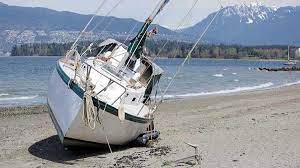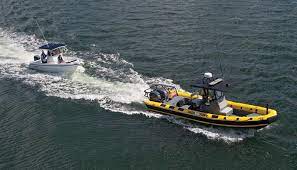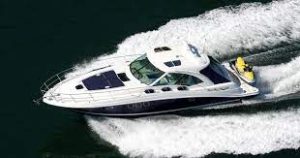If your boat is unintentionally damaged or destroyed by a covered peril like a collision, fire, theft, windstorm, lightning, or vandalism, boat insurance offers physical damage coverage to fix it. This comprehensive insurance covers the boat and its outboard motors, trailer, machinery, auxiliary equipment, and personal goods.
See Life Insurance Guide in 2024
What is Boat Insurance?
In the event of a boating mishap, including if you cause bodily harm or property damage to another person or their property with your boat, a boat insurance policy may protect you, your boat, or your watercraft from liability and damage. If your motorboat, sailboat, or other watercraft is stolen, boat insurance can also provide coverage. The hull, machinery, furniture, or any other items permanently attached to your boat or personal watercraft are among the components of a watercraft that are usually covered by boat insurance coverage (PWC).
Benefits of Boat Insurance
The benefits a boat insurance can offer include:
- Damage Coverage: Boat insurance protects you against losses resulting from mishaps, hurricanes, and other calamities.
- Protection against Physical Injury: Boat insurance can also assist you in protecting against physical injuries that may result from accidents with other boats or your boat.
- Protection from theft: Boat insurance offers larceny protection as well. It is very important, particularly if you reside in a high-crime area.
- Peace of mind is yet another crucial advantage of yacht insurance. When out on the water, having the assurance that you are covered if your watercraft is damaged can make you feel very secure.
- You may be qualified for emergency towing depending on your boat insurance policy. The knowledge that you are not alone can be the greatest source of solace if you are stranded in a remote area.
- Boat insurance can also help you safeguard your investment. Boat insurance will assist in paying off your debt if your boat is totaled in an accident if it is financed.
- Cost-Effectiveness: Boat insurance is incredibly economical. Watercraft insurance is relatively inexpensive when compared to the cost of replacing or repairing your watercraft.
- Anyone who enjoys being on the ocean should consider investing in boat insurance. Boaters can feel secure knowing their vessel is protected from accidents, harm, and theft while on open water. At MD Marine, we provide a range of boat insurance plans specifically designed to suit your requirements.
- Medical insurance: Numerous injuries are sustained in thousands of boating mishaps each year. The price of the medical bills to treat such wounds rapidly mounts, particularly if multiple people are hurt. Hospital bills for injuries sustained while using a boat can be covered by boat insurance, which is one of its primary advantages.
- Avoidance of legal action: You might be embroiled in a pricey lawsuit if you cause a boating mishap that injures swimmers, passengers, or another boat. The expense of medical care, legal fees, and property damage can be high in boating accidents, so it is always wise to purchase boating insurance.
- Investment safety: A boat can be a significant investment, so it’s crucial to have financial security in case of an incident, like a storm, collision, or fire, results in injury to people or harm to your boat. While some homeowner’s insurance policies can cover boats, most policies typically only do so for vessels under 16 feet long and frequently only worth $1,000. The higher the value of your boat, the more crucial it is to purchase “all-risk” insurance coverage that protects against various potential misfortunes.
How Does Boat Insurance Work?
When purchasing boat insurance, you must choose the kinds of coverage you require, the deductible (the maximum out-of-pocket cost per claim), and the amount of coverage you require for your boat. You can submit a boat insurance claim and receive compensation for losses if you are involved in an accident, suffer a theft, or experience another loss covered by your policy.
According to your state’s laws, the insurance coverage you and the other boater have, and whether your boat sustained significant damage in the accident, one of the following outcomes is most likely:
- If you caused harm, your boat liability insurance would pay for it up to the policy’s maximum.
- If the other boater caused the harm, their insurance would cover it up to the limits of their policy and pay for your damages.
- Uninsured/underinsured boaters coverage might be able to pay for the harm if the at-fault boater had no boat insurance or insufficient coverage to cover their costs. (if you had that coverage in place).
Types of Boat Insurance
A form of insurance called boat insurance protects boat owners from damage, accidents, and theft. In addition, it offers financial security if something occurs to your boat, much like auto insurance does. Boat type, residence location, and frequency of use are just a few variables influencing boat insurance prices.
The types of boat insurance:
1. Physical Damage Insurance

Generally speaking, physical damage insurance covers any repairs that are required for damage to your boat as a result of a variety of perils. In addition, the best insurance offers “all risk” coverage, which means that if the source of the loss is not expressly excluded, it is covered.
Typical causes of loss that are covered include collisions with docks, submerged or floating objects, or other boats. Weather-related dangers such as wind, rain, hail, lightning, and wave action are also covered, as well as fire, loss, or harm brought on by theft or vandalism. Choosing insurance that covers your boat while being stored on land or transported by trailer over land is a good idea.
Since the boat owner is responsible for maintaining it, a boat or yacht policy frequently excludes normal wear and tear. Take the time to evaluate policies from different companies to prevent unpleasant surprises regarding the number and type of physical damage exclusions.
2. Personal Property and Assistance with Towing and Emergencies

Personal Property and Emergency Towing & Assistance coverage are two additional exclusions frequently included in boat and yacht insurance plans.
Clothing, personal effects, sporting goods, and fishing tools are covered under personal property insurance while being loaded, unloaded, and while on your boat.
Exclusions differ from company to company, just like physical damage coverage, so comparing helps. When you and your boat require emergency assistance but are not in imminent danger, your emergency towing and assistance coverage pays your expenses. Towing to a location where repairs can be made, fuel, oil, component deliveries, or emergency labor performed while traveling are a few examples of emergency services that you require, and that might be covered.
3. Boat Liability Insurance

A complete boat insurance policy offers many coverages under the liability section that are crucial to boat owners. For example, it’s crucial to have coverage for removing or disposing of your boat’s wreck, particularly if it’s determined that the wreck poses a danger to navigation.
Additionally, boat owners might be liable for any containment and cleanup costs associated with oil contamination or pollution their boat produces. Because vessel owners are accountable for those cleanup costs up to the statutory maximum under the Oil Pollution Act of 1990, your boat or yacht insurance coverage must cover your liability. Verify that your liability policy covers the other boat if you borrow someone else’s.
4. Coverage for Medical Expenses

Make sure your insurance has a sufficient amount of medical payment coverage. Even if you are not legally liable, medical payment coverage will cover any costs associated with someone getting hurt on your yacht, including first aid care, ambulance, hospitalization, and other expenses.
Check to see if the coverage extends to people getting on or off your boat and those being pulled behind your boat for activities like water skiing.
Verify that this coverage includes accidents to you, your family, and any dependents. For example, if insurance coverage amounts are identical, per-person coverage might be preferred to per-accident coverage.
5. Boater Security for Uninsured/Underinsured

Because boat liability insurance is not required, many sailors operate without it. However, insured boater coverage provides financial support if an uninsured boat operator causes an accident that injures you on your vessel.
What is Protected Under Boat Insurance?
Your boat insurance policy could cover these elements:
- If you do not buy optional additional coverage, cleanup of the wreckage may or may not be included in the collision damage category for your boat.
- Your property damage liability insurance covers your potential for causing harm to another person’s watercraft, dock, or other items of property.
- Liability for bodily harm: Covers any harm you might inflict on another person while operating a boat; this includes legal costs, medical expenditures, lost wages, pain and suffering, and other related costs.
- Comprehensive: Offers compensation if your boat is damaged, taken, vandalized, or stolen in an unrelated incident.
- Optional extra coverage includes protection for medical expenses, fishing gear, oil spills, personal property, roadside help, and damage and injuries resulting from collisions with boats whose drivers lack or have insufficient insurance.
- Your deductibles, policy limits, and whether your boater’s insurance pays the agreed-upon value, real cash value, or replacement cost of your boat are some factors that will determine how much money you will be compensated for a boat insurance claim.
Optional extra coverage includes protection for medical expenses, fishing gear, oil spills, personal property, roadside help, and damage and injuries resulting from collisions with boats whose drivers lack or have insufficient insurance.
Your deductibles, policy limits, and whether your boater’s insurance pays the agreed-upon value, real cash value, or replacement cost of your boat are some factors that will determine how much money you will be compensated for a boat insurance claim.
Read Also; Top 10 Hardest Sports in The World 2024
Boat Insurance Conclusion
Physical harm to your boat is covered by boat insurance. Theft or medical expenses, including those for physical harm to passengers and other boaters, will also be covered.
It may not cover regular wear and tear, deterioration over time, insect damage, marring, denting, mold, creatures like sharks or zebra mussels, scratches, manufacturer’s flaws, ice, or broken machinery. When you speak with one of our specialists, they can explain the coverage options and help you match them with your requirements.
Boat Insurance Frequently Asked Questions
How much coverage do I need for my boat?
Your need for boat insurance is influenced by several elements, including the age, value, and size of the boat’s motor and the lender’s, marina’s, state’s, and planned use requirements.
When deciding on a coverage number, it’s a good idea to consider your assets, risk tolerance, and financial situation.
Is Boat Insurance Necessary?
Owning a watercraft entails a unique set of dangers. While sailing, their high speed makes them vulnerable to mishaps and damage, and their high worth makes them an easy target for thieves. A method to protect against potential losses is boat insurance.
Even though it is frequently not legally needed, boat insurance is strongly advised for all boat owners. Without adequate insurance, the costs associated with any damages, thefts, or injuries may be very expensive.
What kind of boat insurance do I require?
Your need for boat insurance will vary depending on the value, age, size, and use of the boat and other variables. For example, suppose you purchase a pleasure cruiser. In that case, you won’t require as much security for bodily harm and property damage liability as if you have a brand-new, high-performance speed boat.
Insurance experts advise purchasing liability insurance for at least $1,000,000 and even more if you have a fast, powerful boat that is more dangerous and capable of causing more harm.
A typical minimum for an uninsured/underinsured motorist policy is $10,000. However, the coverage you buy should account for any potential injuries and property damage that may arise if you or a passenger suffers a severe injury or the vessel is damaged.
Does boat insurance cover passengers?
In the event of a mishap, both the owner and the passengers on the boat are covered. In addition, the liability part of the boater’s insurance covers passengers on board.
However, based on the regulation, you may be unable to tow water skiers behind the boat. Always work with an expert who can assess your requirements and risks.
How is a boat insured?
Car insurance and boat insurance both function in the same ways. You submit a claim with your insurer and ask them to cover the damages if you hurt yourself or someone else, their property, or your boat. If the incident is covered, your insurer will cover the losses or harms up to the limits of your policy.
